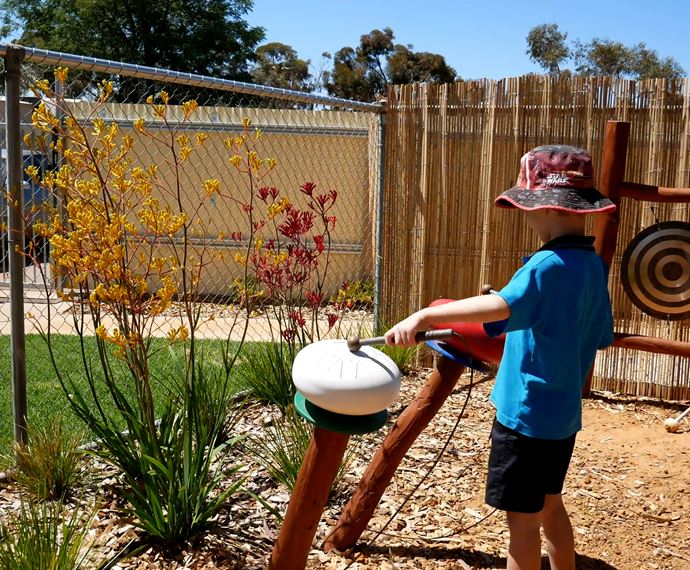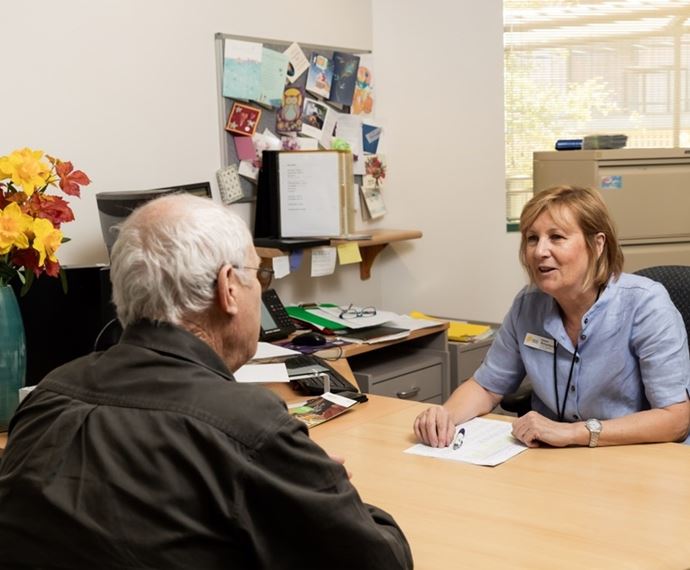WACFL Platinum Partner
Formed in the early 1970s, the West Australian Country Football League (WACFL) is the central body for country football around the state. An affiliate of the West Australian Football Commission, the WACFL network includes 25 Senior Leagues with over 150 Country Clubs, involving 12,500 players, and 5,000 volunteers. In 2019, Healthway partnered with the WACFL to promote the Mental Health Commission’s (MHC) Think Mental Health campaign.
To promote the Mental Health Commission’s (MHC) Think Mental Health campaign.
West Australian Country Football League
1/1/2021
$1,650,000
Healthway
$855,000
State-wide
General Community
- After the first 12 months of the partnership, 94% of participants surveyed recalled at least one element of the Think Mental Health campaign.
- Most survey respondents rated achieving and maintaining their own mental health and wellbeing as important.
- Organisers reported that culture among players had improved, both around sharing how they were feeling and being supportive of those discussions.
- The Think Mental Health campaign has contributed to a high level of buy-in from clubs who are highly motivated to promote the message.
- Evaluation showed that the campaign contributed to the high awareness of the importance of positive mental health.
- Some participants report that by having the message promoted within clubs it can contribute to it having a greater sense of importance and relevance.
- Has had positive uptake in hard to reach communities, particularly the farming community.
- Despite encouraging results following the 12-month evaluation, results indicate that challenges remain in addressing the stigma associated with mental health.
- This includes acknowledging mental health conditions, seeking help and concerns regarding prying into others’ mental health and wellbeing.
- Further research could be done to address these barriers.
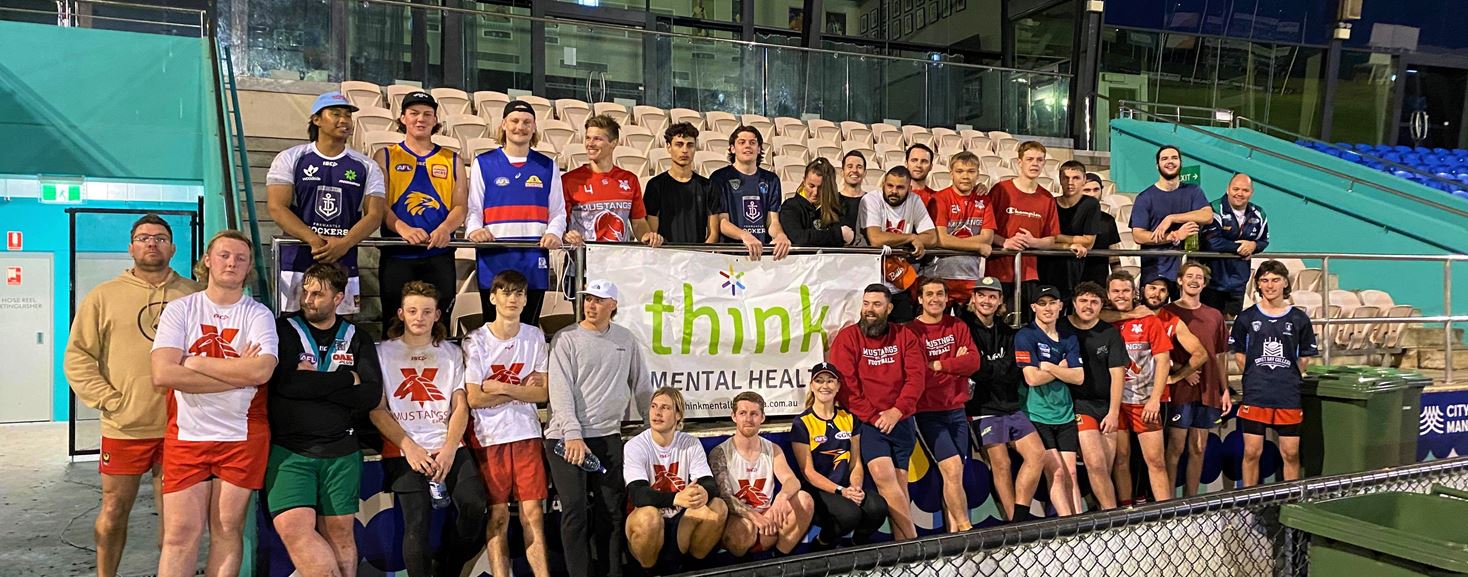
Opportunity
As well as encouraging physical activity, community sporting groups play a key role in bringing communities together [1]. Australian football league clubs are often a hub of the community, especially in regional areas, and are an important central space in moments of celebration or crisis and integral to a community’s identity and sense of belonging [2].
Football games attract a wide audience with many grounds used for a variety of sports. Having social issues communicated in these environments can give messages a greater sense of importance and relevance [1].
The issues relating to mental health concerns in our community are complex and arise from a range of interrelated factors. Australian Bureau of Statistics data indicates that between 2017-2018, 20 per cent of Australians had a mental or behavioural condition, 13 per cent had an anxiety related condition and 10 per cent had depression or feelings of depression [3]. Of particular concern is the high rate of suicide in regional and remote communities – the more remote the community, the higher the rate of suicide [4]. In addition, people in rural and remote communities are less likely to access treatment than those in city areas, and this is likely to contribute to the higher rate of suicide in these communities [5].
The Think Mental Health education campaign is part of a comprehensive WA approach to build mental health and wellbeing and reduce mental health issues with the view of reducing the state’s suicide rate. In 2017, the MHC launched the first phase of the campaign that focussed on assisting the community to connect with the best information, support, and services.
Around the State, the WACFL has a regional network capable of leading and driving social change across a range of issues including alcohol and other drugs, men’s health, and road safety. They are well positioned to promote a campaign targeting mental health, with a strong reach into regional communities around WA. The MHC also has a state-wide network of Suicide Prevention Coordinators who have been important in supporting the WACFL’s program delivery.
Approach
Through this partnership, a capacity building mental health Community Development Program was rolled-out across all 25 Country Football Leagues from the Kimberley to Esperance over a three-year period, commencing in 2019.
This partnership aimed to:
- Increase awareness and understanding of the Think Mental Health message among the target audience.
- Build the capacity of the regional football network with mental health first aid skills and awareness.
- Improve public understanding of the catalysts of good mental health.
- Create opportunities for social inclusion.
- Develop and maintain policies that create healthy environmental and cultural change at League and club level, including responsible alcohol promotion and consumption.
- Reduce the promotion of unhealthy messages or brands which undermine Healthway’s objectives.
Strategies used included:
- Promotion of the Think Mental Health message through activation strategies – Think Mental Health Round and BBQ, Think Mental Health Bush Footy Legends Podcast Series, Clubs’ signage, and branding.
- Development of a healthy club culture through education and resource toolkits, opportunity for training and capacity building of staff and members.
- Provision of bystander mental health training through training of club champions including players, coaches, and administration staff.
- Engaging with clubs to develop strategies regarding the responsible service and consumption of alcohol and addressing the harms of illicit drug use. The program builds upon existing initiatives with support from the Australian Drug Foundation’s Good Sports Program and the MHC Regional Suicide Prevention network.
- Removal of Carlton United Brewing logos and promotions from clubs, ovals, and uniforms across the 25 Country Football Leagues.
- Formation of the Country Football Community Advisory Panel (Advisory Panel), creating a network of experts providing guidance to the WACFL in the development of relevant health and wellbeing policies and procedures for country clubs.
Impact and outcomes
An evaluation conducted after the first 12 months provides some initial insights and lessons from the partnership experience, with 94 per cent of participants recalling at least one element of the Think Mental Health partnership when prompted.
Data also showed that 12 per cent and 13 per cent of those surveyed were aware of Think Mental Health and the Talk to a Mate!® initiatives respectively. Brand recognition for Healthway was high at 72 per cent.
Most respondents also rated achieving and maintaining their own mental health and wellbeing as important (79 per cent). They also saw the value in talking about how they are feeling to find solutions (57 per cent) and believe asking for help as acceptable (100 per cent).
Organisers also reported that culture among players has improved, both around sharing how they are feeling and being supportive of those discussions
Healthway will continue to work with the WACFL from 2022 to 2024 on the Community Development Program. With strong partnerships developed with Regional Men’s Health, the MHC, and Advisory Panel, the program will aim to strengthen local service networks and identify opportunities to educate and build mental health support capacity within the country football community.
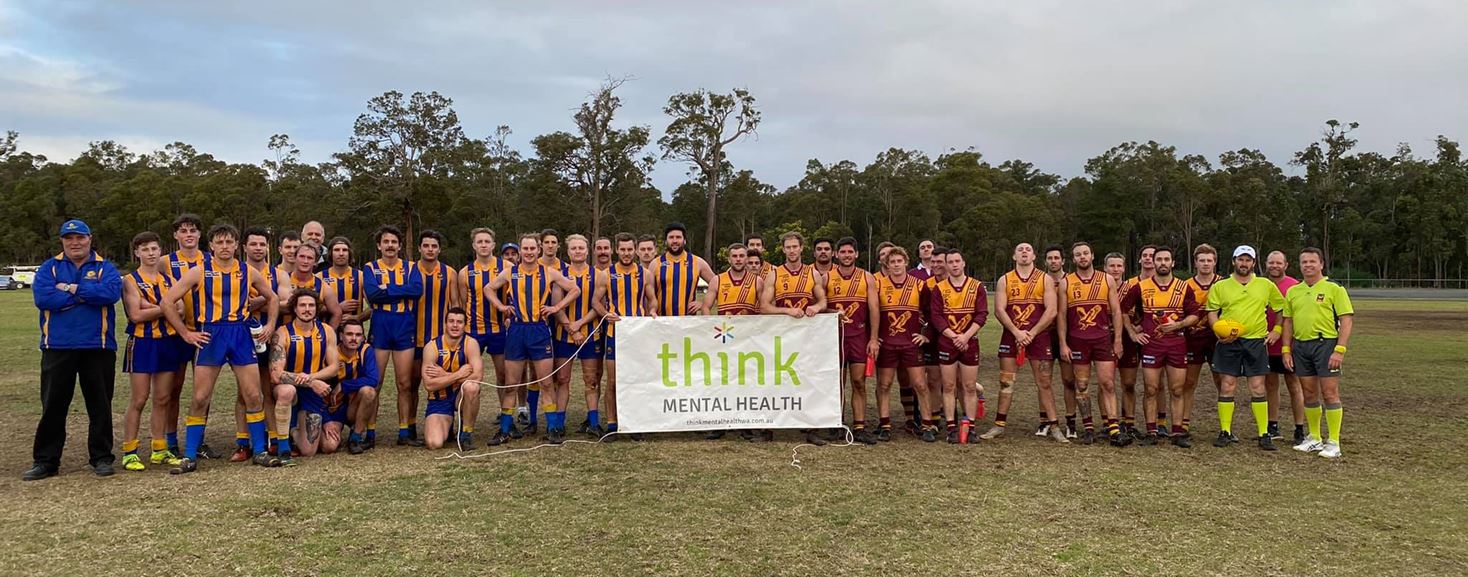
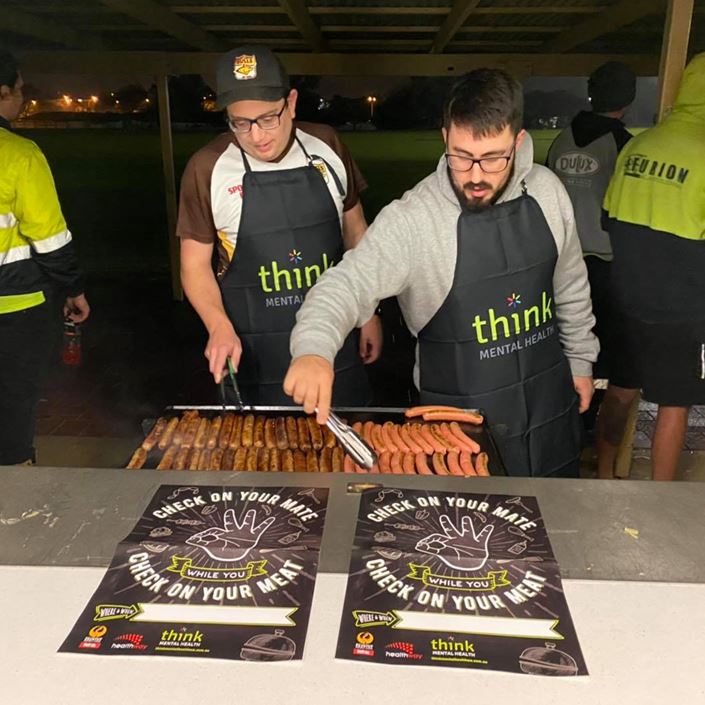
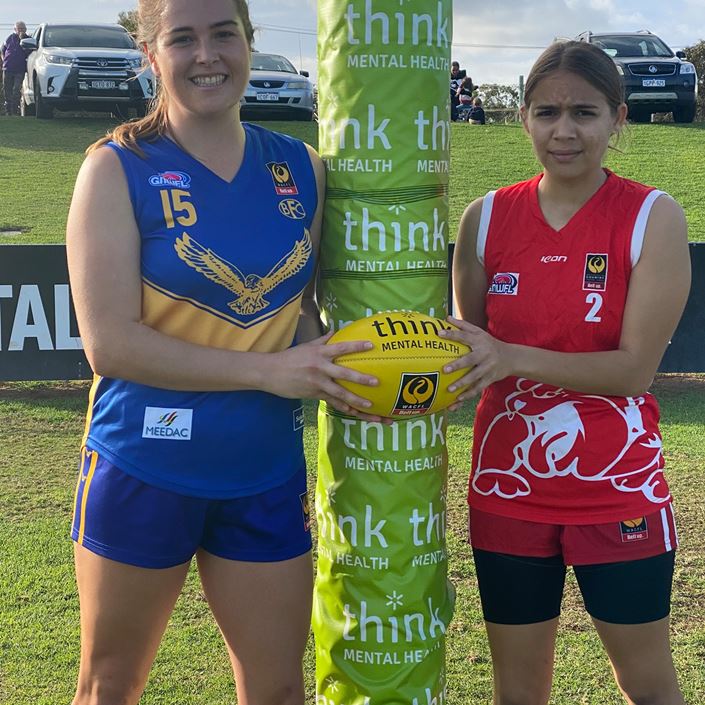
What worked
Good message alignment
The Think Mental Health campaign is strongly aligned to the needs and key concerns of many of the regional communities throughout the WACFL network. This in turn has contributed to a high level of buy-in from clubs who are highly motivated to promote the message. One league organiser said, “the partnership is strong because the message is strong…mental health is the biggest issue in WA…it’s delivering something that’s important to people”.
Effective promotion of the message
Various promotional strategies were used to raise awareness for the Think Mental Health message and the evaluation showed all of these contributed to the high awareness of the importance of positive mental health. Online has the highest recall (69 per cent), then physical activations at clubs (62 per cent) and verbal communications (54 per cent). Advertising and social media posts have the highest individual recall (52 per cent), as well as signage at grounds (45 per cent), websites (43 per cent) and posters (41 per cent). Of the physical activations at each club, holding a Think Mental Health round and a ‘Check on your Mate BBQ’ each contributed to awareness and understanding of the health message [6].
Community sporting clubs provide a receptive audience
For many remote and regional communities, football clubs are the cornerstone of their community. The social aspect and sense of community means that attendees may be more receptive to the Think Mental Health message than they would be to traditional channels like advertising [1]. Some participants report that by having the message promoted within clubs it can contribute to it having a greater sense of importance and relevance. Especially for farmers, football is often their only chance to socialise and possibly their only avenue to talk about mental health issues.
Key challenges
Comfort in asking and offering help
Despite encouraging results following the 12-month evaluation, results indicate that challenges remain in addressing the stigma associated with mental health. This includes acknowledging mental health conditions, seeking help and concerns regarding prying into others’ mental health and wellbeing [6].
The partnership between Think Mental Health and WACFL provides a unique opportunity to focus future messaging in these areas. Specifically, through increasing mental health literacy and challenging current beliefs.
Verbal interactions are most effective
Surveyed participants tended to prefer interactions that were delivered face-to-face, which was not always possible or applied. One participant highlighted “the message is the conversation, rather than looking at it.” Post-game presentations are sometimes limited in impact because players need to leave to travel home after the games and strategies including workshops on game days (as opposed to speeches) and integrating activations into training activities were supported.
Need to tie in with local experts to ensure sustainability
Clubs prefer activations that are easy to implement. While club organisers are generally motivated to assist causes, they tend to have limited resources. Most club staff are volunteers, and have extensive commitments already, both as part of their role as well as in their professional lives. Resourcing limitations are particularly common in agricultural areas during harvest seasons. This may be assisted by tying in with local support networks and involving locally based mental health experts.
REFERENCES
- Robertson, J., R. Eime, and H. Westerbeek, Community sports clubs: are they only about playing sport, or do they have broader health promotion and social responsibilities? Annals of Leisure Research, 2019. 22(2): p. 215-232.
- Centre for Sport and Social Impact, Value of a Community Football Club [Infographic]. . 2014, La Trobe University: Melbourne.
- Australian Bureau of Statistics. Mental health. 2018 12/12/2018 [cited 2021; Available from: https://www.abs.gov.au/statistics/health/mental-health/mental-health/2017-18#state-and-territory-findings.
- Australian Institute of Health and Welfare. Deaths by suicide by remoteness areas. Suicide & self-harm monitoring 2021; Available from: https://www.aihw.gov.au/suicide-self-harm-monitoring/data/geography/suicide-by-remoteness-areas.
- Senate Community Affairs References Committee, Accessibility and quality of mental health services in rural and remote Australia. 2018, Senate Community Affairs References Committee: Canberra.
- Kantar, Public Division. Evaluation of Healthway's Partnership with the WA COuntry Football League, Yr1 Report. 2019
Learn about wellbeing
Understand how your community is going to help you to better target and plan your project.
Ready to plan your project?
Understand your vision, plan your impact and report on the outcomes of your project with three easy interactive tools in the Community Impact Planner.
Acknowledgement of Country
The Western Australian Community Impact Hub acknowledges and pays respect to the Traditional Owners of the land on which we are based, the Whadjuk people of the Noongar Nation and extends that respect to all the Traditional Owners and Elders of this country. We recognise the significant importance of their cultural heritage, values and beliefs and how these contribute to the positive health and wellbeing of the whole community.
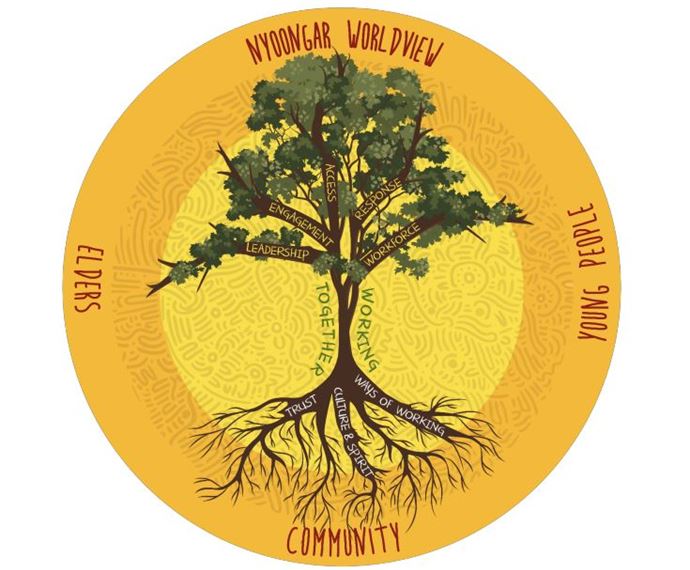
![IMG 8451[1]](/media/yhnbmsph/img_8451-1-resized.jpg?anchor=center&mode=crop&width=690&height=570&rnd=133045355965530000&quality=80)
